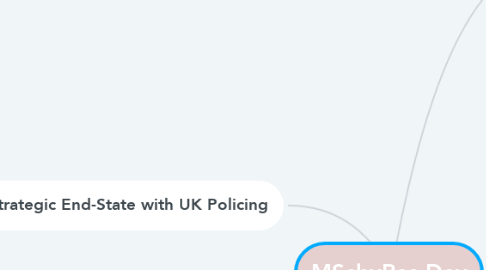
1. Existential Phenomenology of Strategic End-State with UK Policing
1.1. Campbell et al, 1982
1.1.1. Explore
1.1.2. Describe
1.1.2.1. Rich description of the phenomenon in the empirical element
1.1.3. Explain
1.1.4. Emancipated
1.2. Phases
1.2.1. Futures
1.2.1.1. Aim
1.2.1.1.1. Jack Blaiklock, 2017
1.2.2. Ends
1.2.2.1. 'Myth of Sisyphus' Camus, 1942
1.2.2.1.1. 'Minds insistence on familiarity and clarity'
1.2.2.1.2. Dense experiential force of the natural environment
1.2.3. Lived-Experience
1.2.3.1. What is the experience of [pending 'futures' findings] for chief officers within uk policing?
1.2.3.2. What is the experience of [pending 'futures' findings] for uk military commanders with security and stabilisation objectives?
1.2.3.3. What is the experience of determining an end-state for uk policing for chief officers?
1.2.3.3.1. 1.Tell me about your a time when your have had to think about the long-term future of the force?
1.2.3.3.2. 2. In what way is that experience different from thinking about other planning activities?
1.2.3.3.3. 3.
2. What is the experience of preempting a crime?
2.1. How do officers (define further) experience preventative policing actions?
3. Literature
3.1. Catching’ and ‘Targeting’: Risk‐Based Policing, Local Culture and Gendered Practices Helene Oppen Gundhus (2005)
4. Ethics
4.1. Barnes, 1979
4.2. BSC, Code of Ethics
4.3. CoP, Code of Ethics
4.4. Eisner, 1991 (Exploitation)
5. Research Proposal
5.1. Introduction
5.2. Literature Review
5.2.1. Draw out key themes
5.2.2. General Background: use abstracts | introduction
5.3. Methodology
5.3.1. Insider Outsider dichotomy
5.3.2. Retention policy
